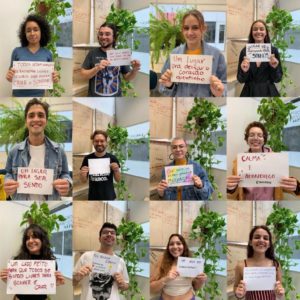Participatory design
-
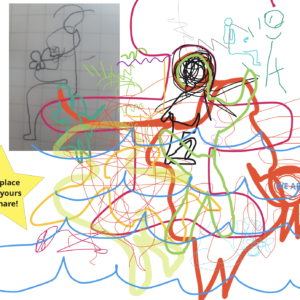
The Relational Becoming of a Participatory Design Commoner
Marttila, S., van Amstel, F., Saad-Sulonen, J., Botero, A., Poderi, G., Teli, M.,and Commoner, P.(2025) The Relational Becoming of a Participatory Design Commoner, in Brandt, E., Markussen, T., Berglund, E., Julier, G., Linde, P. (eds.), Nordes 2025: Relational Design, 6-8 August, Oslo, Norway. https://doi.org/10.21606/nordes.2025.22 - Jul 25, 2025 -
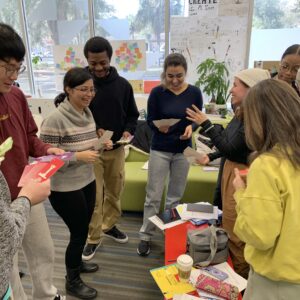
Knowledge self-management in design research
Abstract: What is the difference between knowledge and consciousness, and why does it matter for design? This lecture examines knowledge as a product of consciousness, emphasizing that while knowledge organizes what is already known, consciousness enables the creation of the new. Using examples like ChatGPT—an entity rich in knowledge but devoid of consciousness—it critiques traditional […] - Feb 9, 2025 -
 Abstract: Designing from the positionality of a user instead of the designer’s is a must for designing against oppression. By acknowledging oneself as both a user and a worker, this approach dismantles patriarchal, capitalist, and colonialists paradigms that separates managers from workers, and designers from users. Born out of self-management, this approach thrives on collaboration, […] - Jan 27, 2025
Abstract: Designing from the positionality of a user instead of the designer’s is a must for designing against oppression. By acknowledging oneself as both a user and a worker, this approach dismantles patriarchal, capitalist, and colonialists paradigms that separates managers from workers, and designers from users. Born out of self-management, this approach thrives on collaboration, […] - Jan 27, 2025 -
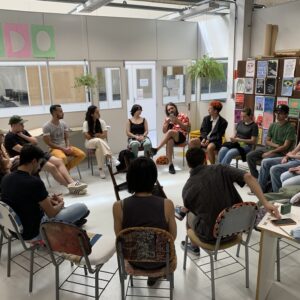 Abstract: Imagine a design studio where aspiring designers break free from traditional hierarchies and redefine what it means to be a designer. In the self-managed studio developed at UTFPR, design students learned that design can serve not just industries but social movements and the public. Inspired by critical pedagogy and radical practices like Theater of the Oppressed, […] - Jan 18, 2025
Abstract: Imagine a design studio where aspiring designers break free from traditional hierarchies and redefine what it means to be a designer. In the self-managed studio developed at UTFPR, design students learned that design can serve not just industries but social movements and the public. Inspired by critical pedagogy and radical practices like Theater of the Oppressed, […] - Jan 18, 2025 -
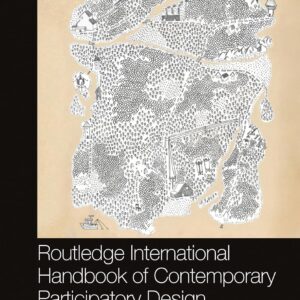
Decolonisation and Participatory Design
Winschiers-Theophilus, H., Smith, R. C., Amstel, F. V., & Botero, A. (2025). Decolonisation and Participatory Design. In Smith, R. C., Loi, D., Heike Winschiers-Theophilus, H., Huybrechts, L. & Simonsen, J. (Eds.). Routledge International Handbook of Contemporary Participatory Design. Routledge. https://doi.org/10.4324/9781003334330 - Dec 25, 2024 -
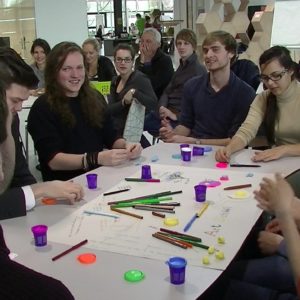 Democratic design experiments, as explored by Binder, Brandt, Ehn, and Halse (2015), are participatory processes that bridge the boundaries between “parliamentary” and “laboratory” practices. These experiments bring people together to explore and discuss the controversies around a thing or a matter of concern. Instead of aiming at creating products or solving problems, these experiments turn design […] - Dec 4, 2024
Democratic design experiments, as explored by Binder, Brandt, Ehn, and Halse (2015), are participatory processes that bridge the boundaries between “parliamentary” and “laboratory” practices. These experiments bring people together to explore and discuss the controversies around a thing or a matter of concern. Instead of aiming at creating products or solving problems, these experiments turn design […] - Dec 4, 2024 -

Systemic userism in service design
Abstract: Userism in service design manifests as a group of humans reduced to be users (and only users) of a given service. Userism prevents these people from cocreating, codesigning, and coproducing services. Transnational (often colonialist) digital services are a case in point; however, userism also appears in analog interfaces. The systemic aspect of userism refers […] - Nov 25, 2024 -
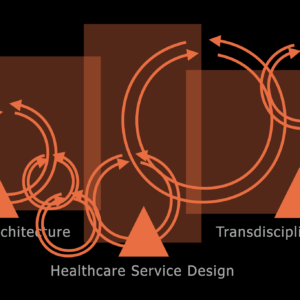
The life cycle of a design research object
Abstract: What is design research? How does it differ from design activity? Consider this distinction regarding the activity’s object. Design activity may be an object of design research in research about design. Yet, in research through design, the research object is shared with another activity, for example, another science. Drawing from personal experiences in hospital […] - Nov 4, 2024 -
 From the outset of their design education at UTFPR, Alanis Louise de Mello Zukowski and Maria Vitória Ribeiro Kosake were struck by a disconnect between their aspirations and the education they received. The design curriculum seemed narrowly focused on technical skills and market demands, leaving little room for critical reflection or social engagement. As they […] - May 9, 2024
From the outset of their design education at UTFPR, Alanis Louise de Mello Zukowski and Maria Vitória Ribeiro Kosake were struck by a disconnect between their aspirations and the education they received. The design curriculum seemed narrowly focused on technical skills and market demands, leaving little room for critical reflection or social engagement. As they […] - May 9, 2024 -
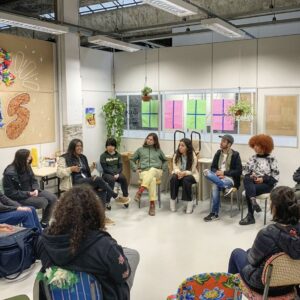
Learning design as a human right: the beginnings of a design lab founded on critical pedagogy
Bizotto dos Santos, W.B., Mazzarotto, M.,and Van Amstel, F. (2023). Learning design as a human right: the beginnings of a design lab founded on critical pedagogy, in Derek Jones, Naz Borekci, Violeta Clemente, James Corazzo, Nicole Lotz, Liv Merete Nielsen, Lesley-Ann Noel (eds.), The 7th International Conference for Design Education Researchers, 29 November – 1 December […] - Mar 18, 2024 -
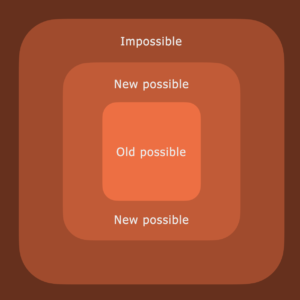
Designing between the possible and the impossible
Abstract: The possible is relatively constituted to what is meant to be impossible. Whenever someone does something formerly known to be impossible, the possible expands, and a new frontier appears. Expanding this box is not trivial, though. Contradictions binding the dos and don’ts demotivate any naïve attempt to design at the border. Expansive design is […] - Oct 21, 2023 -
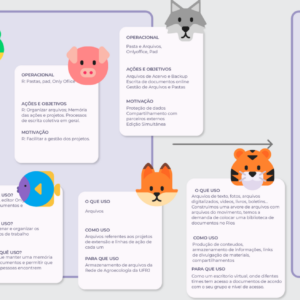 The final work of Isabela Luiza Molin de Siqueira in her Bachelor of Design studies at UTFPR is the redesign of a Computer Supported Collaborative Work platform called Rios, a tool used by social movements and non-profit organizations in Brazil that builds on their past experience of using Corais. Rios is developed by Eita Coop. […] - Jul 11, 2023
The final work of Isabela Luiza Molin de Siqueira in her Bachelor of Design studies at UTFPR is the redesign of a Computer Supported Collaborative Work platform called Rios, a tool used by social movements and non-profit organizations in Brazil that builds on their past experience of using Corais. Rios is developed by Eita Coop. […] - Jul 11, 2023 -
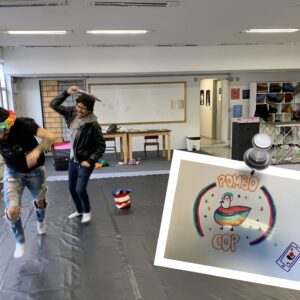
Making work visible in the theater of service design
Capitalist service design is grounded on a theater metaphor that guides service designers to make work invisible, away from customer scrutiny and public accountability. In this way, service design contributes to hiding the extreme work exploitation that digital service workers undergo, generating a situation where workers can only reclaim their visibility through striking. If service […] - Feb 24, 2023 -
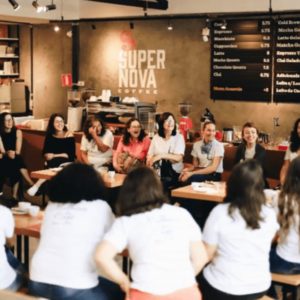
Matters of Care in forming feminist design coalitions
Eleutério, Rafaella P.; Van Amstel, Frederick, M. C. (2023). Questões de cuidado na formação de uma coalizão de design feminista [Matters of Care in forming feminist design coalitions]. Arcos Design, 16(1). https://doi.org/10.12957/arcosdesign.2023.71093 - Jan 12, 2023 -
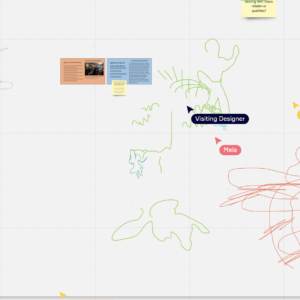
Assembling collective bodies to take care of the commons
As part of the Participatory Design Conference 2022, I joined P.D. Commoners, a self-managed collective of researchers working at the boundaries of commoning and designing, to organize a workshop on Relationality, Commoning, and Designing. After the workshop, we recorded a podcast with Joanna Sad-Sulonen and Giacomo Poderi to summarize and share the workshop experience with […] - Jan 11, 2023 -
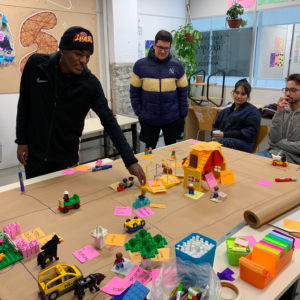
Iguaçú III community center (2022)
Uniperifa collective joined Laboratory of Design against Oppression students to plan community actions in Condomínio Residencial Parque Iguaçú III. This slum-upgrade urban project relocated people near the city center to the city outskirts, leaving people disconnected from the city and having little sense of community. We identified several sustainability issues that required increasing this sense […] - Dec 13, 2022 -
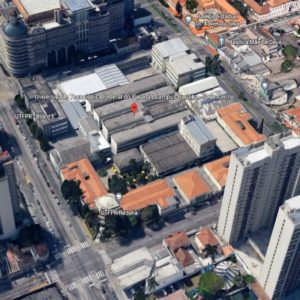
UTFPR Curitiba master plan (2022)
UTFPR Curitiba formed its first Campus Master Plan Committee in 2022 to plan its future spatial developments. The campus has three localities. Seeking for broader adoption, the committee adopted a participatory design approach. The entire university community will be invited to collaborate in the planning process through various activities and methodologies. The goal is to […] - Dec 13, 2022 -
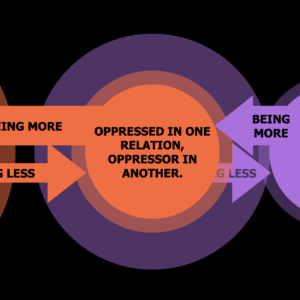
Can designers change systemic oppression?
This talk was part of the Royal College of Art Symposium on Design and Systemic Change, organized by Product Design students. Abstract: Oppression is systemic as it is reproduced across social groups, generating complex patterns of domination. What can designers do to stop such reproduction? First, they need to acknowledge their role on the oppressor’s […] - Dec 12, 2022 -
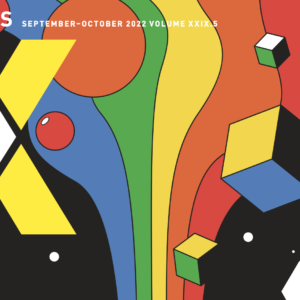
Assets and community engagement: a roundtable with HCI researchers and designers
Lucy Pei, Edgard David Rincón Quijano, Angela D. R. Smith, Reem Talhouk, and Frederick van Amstel. 2022. Assets and community engagement: a roundtable with HCI researchers and designers. interactions 29, 5 (September – October 2022), 44–47. https://doi.org/10.1145/3554975 - Sep 2, 2022 -

Relationality, commoning, and designing
Poderi, G., Marttila, S. M., Saad-Sulonen, J., Van Amstel, F. M., Teli, M., Tonolli, L., D’Andrea, V. & Botero, A. (2022, August). Relationality, commoning, and designing. In Proceedings of the Participatory Design Conference 2022-Volume 2 (pp. 255-258). https://doi.org/10.1145/3537797.3537879 - Aug 24, 2022 -
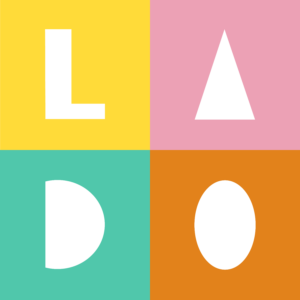
Laboratory of Design against Oppression (LADO)
The Laboratory of Design Against Oppressions (LADO) is an open, horizontal space for critical education, scientific research, and transformative action at UTFPR. Attentive to the objectives of student involvement and participation in university outreach, LADO is organized through self-management, including collective decision-making and distribution of power among the several working groups created to coordinate each of […] - Aug 11, 2022 -
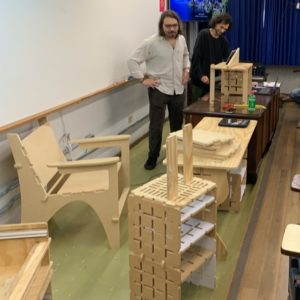 SURU’BA (“good thing” in Tupi and “orgy” in Portuguese) is the final work of João Conrado Dembiski and João Victor Tarran in their Bachelor in Design at UTFPR. Inspired by anarchist and decolonial thinking, the duo designed a modular open-source furniture system that could be cheaply produced in Curitiba, the locality of their studies. Their […] - Jul 30, 2022
SURU’BA (“good thing” in Tupi and “orgy” in Portuguese) is the final work of João Conrado Dembiski and João Victor Tarran in their Bachelor in Design at UTFPR. Inspired by anarchist and decolonial thinking, the duo designed a modular open-source furniture system that could be cheaply produced in Curitiba, the locality of their studies. Their […] - Jul 30, 2022 -
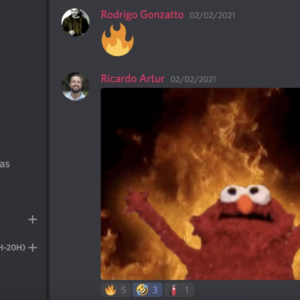
Weaving design as a practice of freedom: Critical pedagogy in an insurgent network
Serpa, B.O., van Amstel, F.M., Mazzarotto, M., Carvalho, R.A., Gonzatto, R.F., Batista e Silva, S., and da Silva Menezes, Y. (2022) Weaving design as a practice of freedom: Critical pedagogy in an insurgent network, in Lockton, D., Lenzi, S., Hekkert, P., Oak, A., Sádaba, J., Lloyd, P. (eds.), DRS2022: Bilbao, 25 June – 3 July, Bilbao, […] - Jun 21, 2022 -

Design pedagogy, the body, and solidarity in designing commons
Podcast interview for the Commoning Design & Designing Commons show, an initiative from the Interest Group Commons and Commoning of the IT University of Copenhagen. Listen to the podcast on Anchor. Transcript Speaker Key – GP Giacomo Poderi; FA Frederick van Amstel; SM Sanna-Maria Marttila; JS Joanna Saad-Sulonen Speaker Text GP Okay, welcome to this first […] - Apr 12, 2022 -
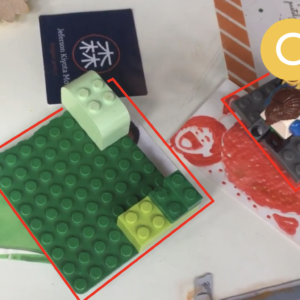 Storyblocks is the tridimensional equivalent of the storyboard: it represents the basic elements of a scene sequence in a film or animation movie through building blocks. After building the scene and materializing its components, the framing and camera movements can be experimented with using still photos or improvised videos. It is a fast low-fidelity technique […] - Mar 26, 2022
Storyblocks is the tridimensional equivalent of the storyboard: it represents the basic elements of a scene sequence in a film or animation movie through building blocks. After building the scene and materializing its components, the framing and camera movements can be experimented with using still photos or improvised videos. It is a fast low-fidelity technique […] - Mar 26, 2022 -

Shared Management Handbook (2021)
Shared Management Handbook is the final work of Luciane Hulyk to obtain her Graphic Design degree at UTFPR. The book was collaboratively written and participatory designed with the Mandala Network, a collective of local artisans who wanted to share their experience with self-management and solidarity economy. The book reads like a manual for those who […] - Jan 8, 2022 -
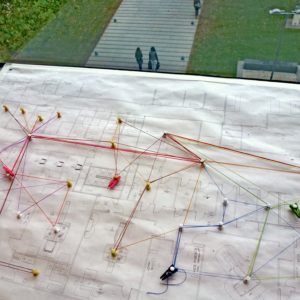
The role of games in developing transformative agency
Van Amstel, Frederick M.C. (2021). The role of games in developing transformative agency. Brazilian Journal of Socio-Historical-Cultural Research and Activity, 3(2). https://fredvanamstel.com/journal/the-role-of-games-in-developing-transformative-agency - Dec 31, 2021 -

Designing relations in Prospective Design
Prospective design is a new design approach developed at Federal University of Technology Paraná inspired by Carnegie Mellon University’s Transition Design approach. This short talk explains two of the differences between the approaches: 1) instead of focusing on alternative futures, Prospective Design focuses on alternative presents; 2) instead of framing situations as systems, it frames […] - Nov 12, 2021 -

Investigar-crear para la liberación
Esta charla és una reflexión acerca de mi condición existencial de investigador del diseño en un país subdesarrollado que no prioriza la ciencia para su desarrollo. En la condición de subdesarrollo, el investigador debe identificarse con la gente y con la gente crear proyectos de investigación libertadores. Así, se puede detener a los problemas locales […] - Oct 28, 2021 -
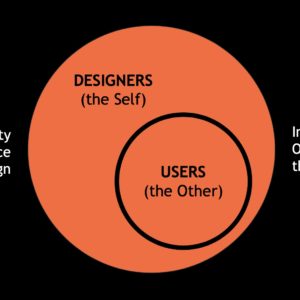
Radical Alterity in Experience Design
Abstract: In Experience Design, we typically learn to design experiences for others, the users. While drawing this distinction between us and them, we block the potential to change who we are by designing for ourselves. Radical alterity means including the Other as part of the Self. It is a concept crafted on decolonial Brazilian anthropophagic […] - Jun 22, 2021 -
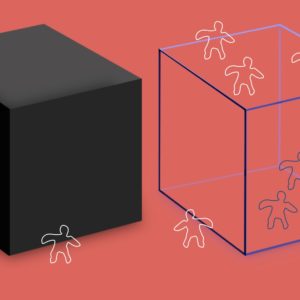 As institutions or individuals, design bodies have been weaponized for war, colonization, racism, sexism, ableism, and other forms of oppression. This talk reports on the Designing for Liberation research program that, since 2010, engages diverse design bodies with the fight against all forms of oppression. This program unleashes designing potentials that have been prevented or […] - Apr 8, 2021
As institutions or individuals, design bodies have been weaponized for war, colonization, racism, sexism, ableism, and other forms of oppression. This talk reports on the Designing for Liberation research program that, since 2010, engages diverse design bodies with the fight against all forms of oppression. This program unleashes designing potentials that have been prevented or […] - Apr 8, 2021 -

Commoning Design: a Pluriversal Slide-Deck
The Commoning Design pluriversal slide-deck is the outcome of a collaborative effort which involved people with different interests, skills, and backgrounds united by their shared curiosity around the relationship between commoning and design. Such effort took place in the context of the Participatory Design Conference 2020 and organized around the workshop “Commoning Design and Designing Commons”. This deck […] - Dec 8, 2020 -
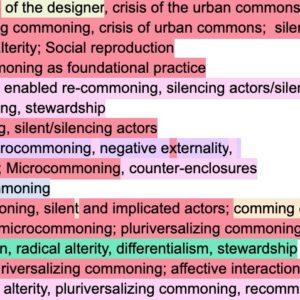
Commoning design and designing commons
Botero, A., Marttila, S., Poderi, G., Saad-Sulonen, J., Seravalli, A., Teli, M., & van Amstel, F.M.C. (2020, June). Commoning Design and Designing Commons. In Proceedings of the 16th Participatory Design Conference 2020-Participation (s) Otherwise-Volume 2 (pp. 178-180). DOI: https://doi.org/10.1145/3384772.3385162 - Jun 24, 2020 -
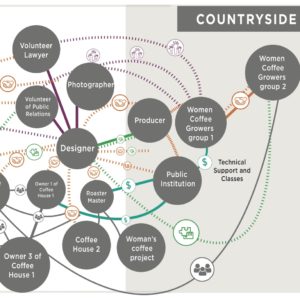
Matters of Care in Designing a Feminist Coalition
Eleutério, Rafaella P. and Van Amstel, Frederick M.C. Matters of Care in Designing a Feminist Coalition. (2020). In: Proceedings of the 16th Participatory Design Conference. Manizales, Colombia. DOI: https://doi.org/10.1145/3384772.3385157 - Jun 13, 2020 -
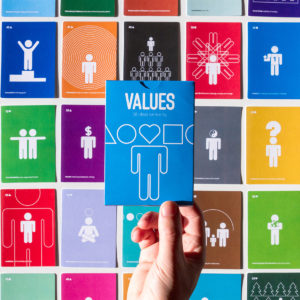 This method uses Genis Carrera’s Values Deck to visualize the priorities of a group, project, or organization. The method is relatively simple: gathering the people involved to vote on the human values they want to produce together. Each card represents a human value, such as sustainability, creativity, wealth, etc. They are laid down on a […] - Jun 10, 2020
This method uses Genis Carrera’s Values Deck to visualize the priorities of a group, project, or organization. The method is relatively simple: gathering the people involved to vote on the human values they want to produce together. Each card represents a human value, such as sustainability, creativity, wealth, etc. They are laid down on a […] - Jun 10, 2020 -
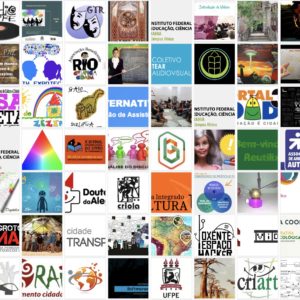
Anthropophagy traces in a cultural commons platform
Van Amstel, Frederick M. C. (2020) Anthropophagy traces in a cultural commons platform. Commoning Design and Designing Commons Workshop (position paper), Participatory Design Conference, Manizales. - May 18, 2020 -
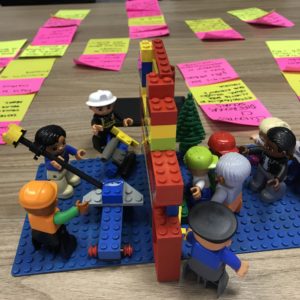
Lego Physical Oxymoron (LEPOX)
LEPOX challenges the participants to collaboratively identify and materialize a contradiction using Lego pieces. This game is inspired by the LEGO Serious Play ® method, which relies upon physical metaphors for improving team communication. The participants are invited to make a model of what they perceive to be a contradiction in terms — a physical […] - Apr 6, 2020 -
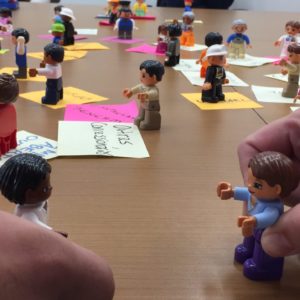
Stake Holder Analysis with Lovely Links (SHALL)
SHALL is short for Stake Holder Analysis with Lovely Links. It consists of mapping all the stakeholders possibly interested in a problem through their organization and inter-organizational relationships. Each stakeholder is mapped as a doll and relationships are loosely represented as a thread connecting the dolls. The game starts by asking the participants to map […] - Apr 6, 2020 -
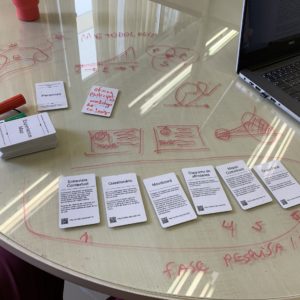
Designing Metaobjects for Collaboration, Participation and Debate
This research theoretically develops and empirically tests the concept of metaobject in design projects with special needs for collaboration, participation, or debate. Metaobjects are objects that represent and support the design of new objects in metadesign processes, such as a sketch, a model, or a prototype. In design projects, metaobjects must represent multiple perspectives and […] - Mar 25, 2020 -

Participatory Design in Transition Projects from the Global South
Multiple versions of Participatory Design emerged in different contexts and disciplines. Despite taking advantage of knowledge generated by the Global South, such as Participatory Action Research, Participatory Design is mainly practiced based on Northern theories, such as critical theory, post-structuralism, and phenomenology. Despite their contributions to building a democratic approach to design, these theories did […] - Mar 25, 2020 -
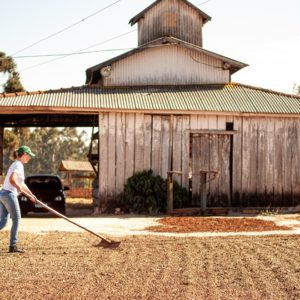
Women Coffee Worker Coalition (2019)
Women Coffee Worker Coalition is the final work of Rafaella Peres Eleuterio to obtain her Bachelor degree in Design at UTFPR. Rafaella had some relatives who worked on the coffee fields of Northern Paraná but she never engaged directly with this production. After seeing the coffee packages which sold their produce in the city, she […] - Oct 9, 2019 -
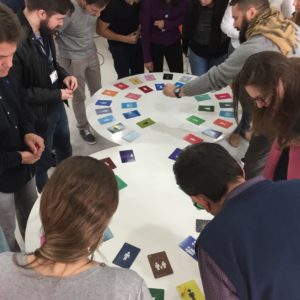 Design patterns deconstructs the myth that design projects are created by a single consciousness, the lonely designer. Every project, be that developed by a single designer or by a design team, reproduces common patterns that society at large cultivates. Card decks collect and organize design patterns with common problems and solutions in a certain design […] - Nov 22, 2018
Design patterns deconstructs the myth that design projects are created by a single consciousness, the lonely designer. Every project, be that developed by a single designer or by a design team, reproduces common patterns that society at large cultivates. Card decks collect and organize design patterns with common problems and solutions in a certain design […] - Nov 22, 2018 -
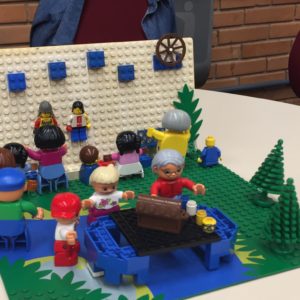 The Experience Map is an abstract representation which might not be understood by stakeholders who are responsible for shaping that experience. Since their participation is essential to stage the experience, I developed a Tangible Experience Model with uses Lego pieces to represent the relationships between people, things, spaces, and activities. Since the model’s meaning relies […] - Nov 4, 2018
The Experience Map is an abstract representation which might not be understood by stakeholders who are responsible for shaping that experience. Since their participation is essential to stage the experience, I developed a Tangible Experience Model with uses Lego pieces to represent the relationships between people, things, spaces, and activities. Since the model’s meaning relies […] - Nov 4, 2018 -
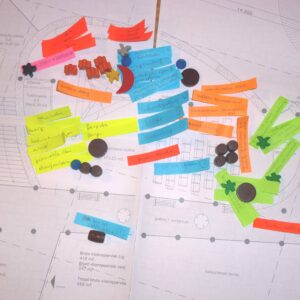 Design games are created for specific projects or reused from past projects to develop concepts that have real consequences in a participatory project. The outcomes of these games serve not only to inform but also to guide, plan, and frame the project, creating an environment conducive to more creative and informed decision-making. These games often […] - Sep 10, 2016
Design games are created for specific projects or reused from past projects to develop concepts that have real consequences in a participatory project. The outcomes of these games serve not only to inform but also to guide, plan, and frame the project, creating an environment conducive to more creative and informed decision-making. These games often […] - Sep 10, 2016 -
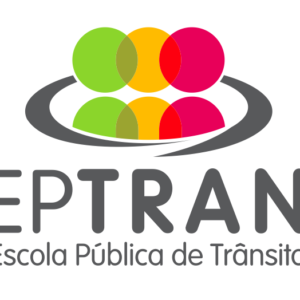
Curitiba Traffic Education School visual identity (2016)
EPTRAN, Curitiba’s traffic education school, needed to codesign a logo with its supporting community. I helped them to organize a workshop in which traffic agents, mobility activists, teachers and drivers codesigned a visual identity for the school. The workshop used various techniques to support people in understanding the design possibilities and considering alternatives from their knowledge […] - May 13, 2016 -
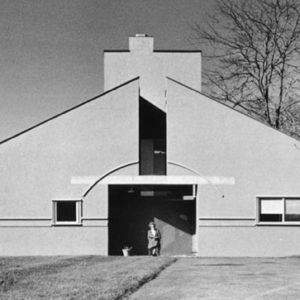
Representing contradictions without trying to solve them
Design-oriented ethnography seeks to find opportunities for innovation in social activities. Disturbances, tensions, and conflicts are sometimes used to ground or justify these opportunities, as if they could be avoided by an innovation. Ethnographers know that social contradictions cannot be resolved by design since they depend on collective endeavors; however, they still need to provide […] - Nov 20, 2015 -
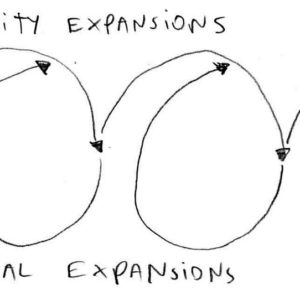 Expansive design is a concept defined by psychologist Yrjö Engeström to characterize a particular way of doing interaction design which I developed further in my PhD thesis. It means expanding the design activity towards the use activity, or in other words, connecting them together. This connection is characterized by co-creation; instead of merely producing objects […] - Nov 20, 2015
Expansive design is a concept defined by psychologist Yrjö Engeström to characterize a particular way of doing interaction design which I developed further in my PhD thesis. It means expanding the design activity towards the use activity, or in other words, connecting them together. This connection is characterized by co-creation; instead of merely producing objects […] - Nov 20, 2015 -
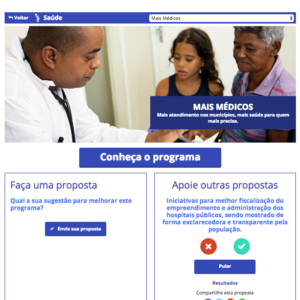
Dialoga app and Social Participation Living Lab (2015)
Brazil former president Dilma Rousseff wanted to improve the participation of society in the decisions of the federal government and ordered the creation of a Social Participation Secretary at the beginning of 2015. By that time I just returned to Brazil after my four years as a PhD student in the Netherlands. Ms. Rousseff officers asked my help […] - Aug 13, 2015 -
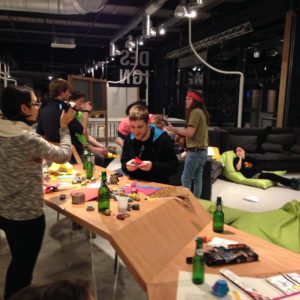
Guanabana thing at the DesignLab (2014)
As part of the Collaborative Future Making master class, a group of students (Thijs Baltes, Alex Ceha, Riccardo Rigo and Isabel Pfab) designed a thing to intervene with the incipient DesignLab at the University of Twente. The group mapped the contradiction that was pressing the DesignLab development at its early stage: the lack of a […] - Apr 21, 2015 -
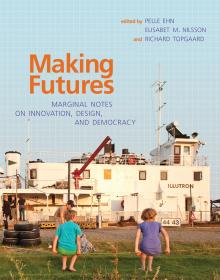 Prof. Pelle Ehn from Malmö University gave a Masterclass (45 hours) at the University of Twente about the latest advances in his research group from the 2nd of February to the 17th of April of 2015, as part of the initial activities of the UT DesignLab. This course was based on a book called Making Futures. Frederick assisted […] - Jan 19, 2015
Prof. Pelle Ehn from Malmö University gave a Masterclass (45 hours) at the University of Twente about the latest advances in his research group from the 2nd of February to the 17th of April of 2015, as part of the initial activities of the UT DesignLab. This course was based on a book called Making Futures. Frederick assisted […] - Jan 19, 2015 -
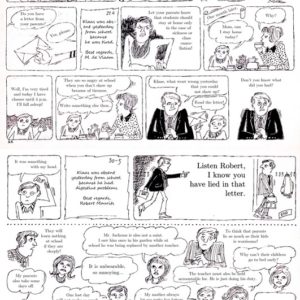
How to represent contradictions
Contradictions are social tensions that accumulate in the history of a society. When they reach the peak, conflicts come to the surface and society has to take action to change what is feeding the contradiction. In simple words, it is necessary to attack the root of the problem. There are design approaches that try to […] - Jan 5, 2015 -
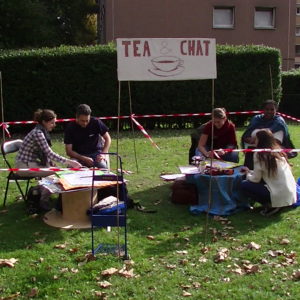
High-speed train social impact study (2014)
This study conducted by Architecture Sans Frontières UK aimed to highlight the social impact to be caused by the high-speed train connection to Birmingham, HS2. The connection will cost around 50 billion Pounds and will transform part of London into a big construction site. To accommodate the expansion of the Euston Station, 3 to 6 housing […] - Sep 25, 2014 -
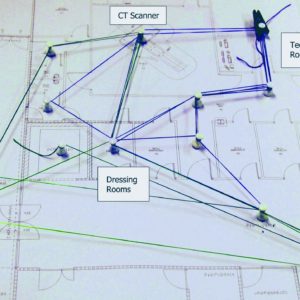
Expanding the representation of user activities
Van Amstel, F. M.C., Zerjav, V., Hartmann, T., van der Voort, M. C., & Dewulf, G. P. (2015). Expanding the representation of user activities. Building Research & Information, 43(2), 1-16. DOI: https://doi.org/10.1080/09613218.2014.932621 - Jul 15, 2014 -
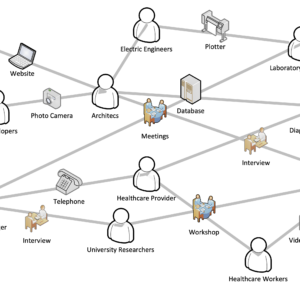
Participation and transdisciplinarity
Participation is an issue that crosses the boundaries of a single discipline. Its fundamental assumption is that people can make better decisions together than led by a single discipline. To approach participation in the renovation of healthcare facilities, it is important to consider disciplines concerned with the built environment – Architecture, Engineering, and Construction (AEC), […] - May 15, 2014 -
Using smartboards to enable user participation in architecture
Last week, I demoed my Walking Paths application at 3TU Innovation & Technology conference using a Smartboard that allows touch and pen interaction. To explain how it enables user participation in architecture, I presented a model of the building where the conference was held and asked visitors to draw the path they took across the […] - Dec 9, 2013 -
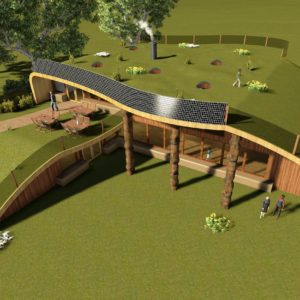
Natuurhus Almelo Nature Center (2013)
Different nature-related associations join forces to build a nature center in the middle of a small city in The Netherlands. My role in the project was to interview the stakeholders and provide a map of controversies around the project requirements. After mapping controversies, I helped them to organize a workshop where these controversies would be […] - Nov 13, 2013 -
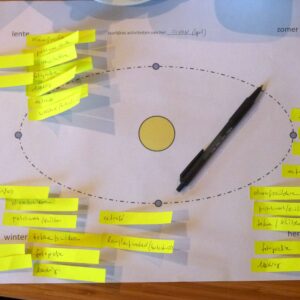 Grounding Activities is a participatory design game developed as part of a nature center project to help stakeholders speculate their future activities over a proposed architectural space. The game follows a structured process in three phases, guiding participants to explore their activities’ temporal and spatial dimensions and assess how well a proposed design meets their […] - Sep 10, 2013
Grounding Activities is a participatory design game developed as part of a nature center project to help stakeholders speculate their future activities over a proposed architectural space. The game follows a structured process in three phases, guiding participants to explore their activities’ temporal and spatial dimensions and assess how well a proposed design meets their […] - Sep 10, 2013 -
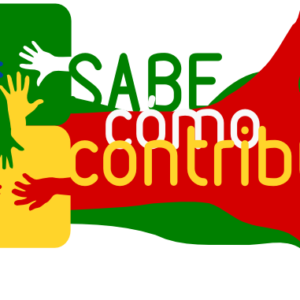
Social participation vocabulary (2012)
This was one of the projects that emerged in Corais Living Lab: a vocabulary to classify and share data across electronic public participation applications and websites. I did not organize the project but joined as a host in Corais. I really liked this project since it lays the foundation for a more democratic society in […] - Nov 24, 2012 -
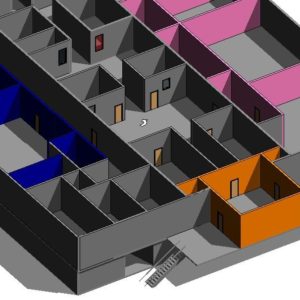
Medical Imaging Center (2011-2013)
The intervention had the goal of assisting practitioners to bridge the gap between the design activity and user activity in a Medical Imaging Center project, in the Netherlands. The center would have state of the art diagnosing machines based on techniques such as Magnetic Resonance Imaging (MRI), Positron Emission Tomography (PET-MRI), Computed Tomography (CT), and […] - Jun 14, 2012 -

When Participatory Design makes sense
In the course of writing my PhD proposal to the disciplinary council of my faculty, I had to define which kind of project could be appropriate for doing Participatory Design research. Not every project can be participatory or profit from being participatory. There are specific situations where Participatory Design makes sense, but I couldn’t find […] - Jun 4, 2012 -

Spreading participation into the routine
Participatory Design usually happens in ritualized gathering where participants enact their political positions and build things together. The workshop creates an ephemeral horizontal power structure where people from the lowest level can work with medium an top level of the hierarchy. From what I observe so far in the Healthcare Construction Industry, where I conduct […] - Mar 1, 2012 -
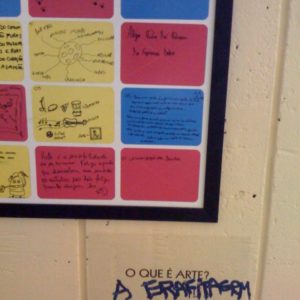
Public participation can revitalize decaying places
I’m currently on vacation in Brazil enjoying the time to think on how will I contribute to Brazilian society when I’ll be back from my PhD on Participatory Design in Netherlands. One thing that I often hear is that participation can only work in advanced democracies. It wouldn’t work in Brazil because people wouldn’t make […] - Jan 23, 2012 -
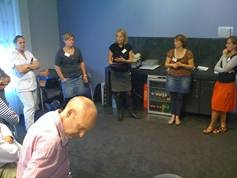
Enabling participation in healthcare construction
After conducting initial observations on two healthcare projects — a new medical image center and a hospital reallocation, I identified three shortcomings for Participatory Design in healthcare construction: lack of proper tools to collaborate over design models with non-design experts economic and political costs for scheduling meetings over reliance on consensus to move design process […] - Dec 2, 2011 -
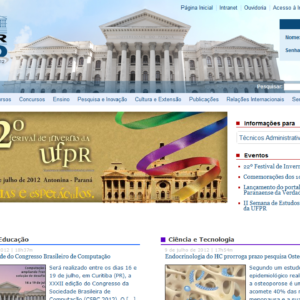
UFPR University Website (2010)
The website of a major public university, with hundreds of pages and departments competing for a pixel at the homepage. It took 3 years to redesign it from the ground up. The University had to assemble a team to develop and manage it internally. My role was to train and guide this team to achieve […] - Sep 11, 2010 -
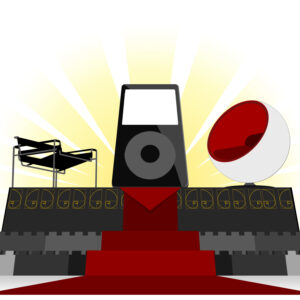
The Church of the Divine Design (2010)
The Church of the Divine Design is a provocative design fiction project developed at Faber-Ludens Institute for Interaction Design. This initiative humorously critiques and explores the role of design and designers in contemporary society by parodying the rise of Protestant work ethic and corporativism in Brazilian design practice. It seeks to engage the public in […] - Jul 11, 2010 -
From Interfaces to Interactions: Participatory Design of the BrOffice.org Portal
Abstract The complexity of communication processes mediated by technology has attracted the attention of several areas. In a pragmatic perspective, Interaction Design strives for designing these medias for a particular community, however this process occurs within a political scenario of cultural conflicts. The option of participatory design advocates the individual´s autonomy to develop social uses […] - Jul 7, 2010
